Many skills are needed to succeed in life. In this article, I will discuss 10 skills for success. There are generally two types of human skills: technical skills and human skills. We can learn about various aspects and applications of technical skills through higher studies. Apart from these, several skills have to be gained on our own. The emphasis on developing ‘soft skills’ in jobs or higher studies all over the world is generally referred to as these human skills.
No matter how skilled you are in technical terms, it is difficult to succeed in your career without human skills. So, no delay—let’s begin the top 10 powerful skills for success in your career.
Table of Contents
Here are the 10 best skills for success
1. Learn to think positively
How you think is a measurement of how skilled you are. You may know about the benefits of positive thinking. It is found in the study that those who think positively can defeat sadness easily. A positive outlook is more beneficial for your mental health than negative thinking. Positive thinking has some health benefits. Studies suggest that you may get rid of many diseases like breast cancer, colorectal cancer, infection, heart disease, lung cancer, uterine cancer, various respiratory diseases, and stroke just by thinking positively.
Researchers have also found that optimistic people are physically and mentally healthier than pessimists. Positive thinking increases immunity and the ability to tolerate stress and reduces depression.
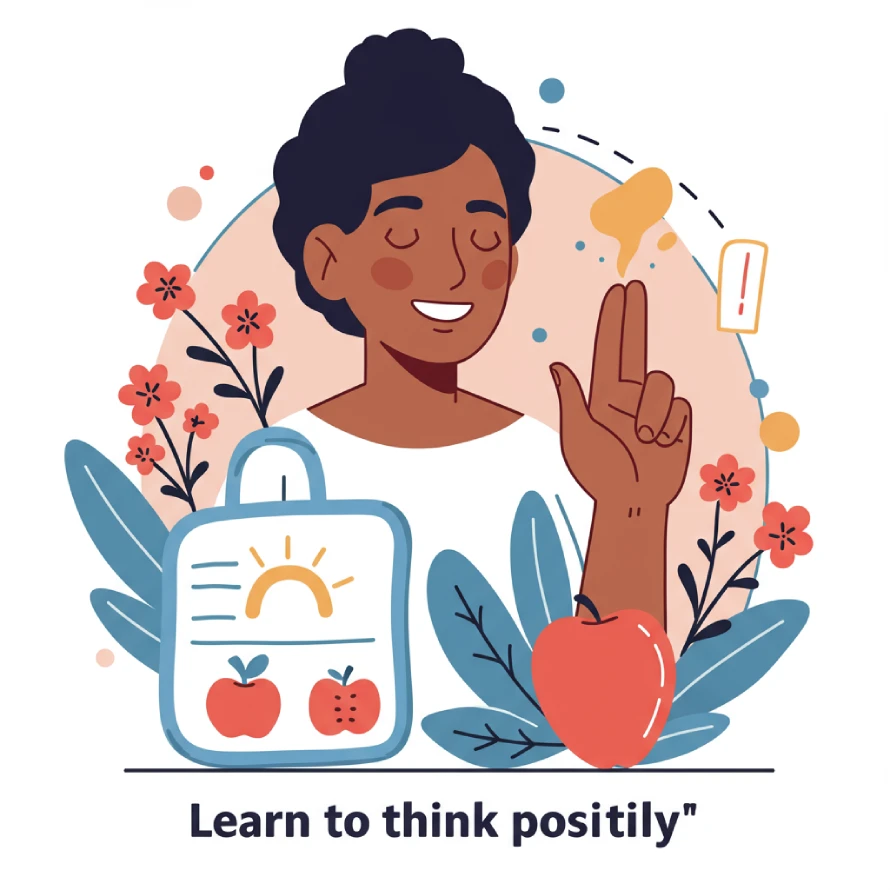
There are some things you can do to learn how to think positively. For example,
- Stop negative self-talk
- Laugh and joke
- Sow the seeds of optimism
- Practice gratitude
- Keep trying
When you see that you are unable to think of anything good, then seek the advice of a psychiatrist or psychotherapist.
In a word, you should learn to think positively in all spheres of your life and spread it among everyone.
2. Communication Skills
Communication skills are one of the most important skills out of the 10 skills for success. Whatever your field of study, whatever career you pursue, it is important to have communication skills. You need to master:
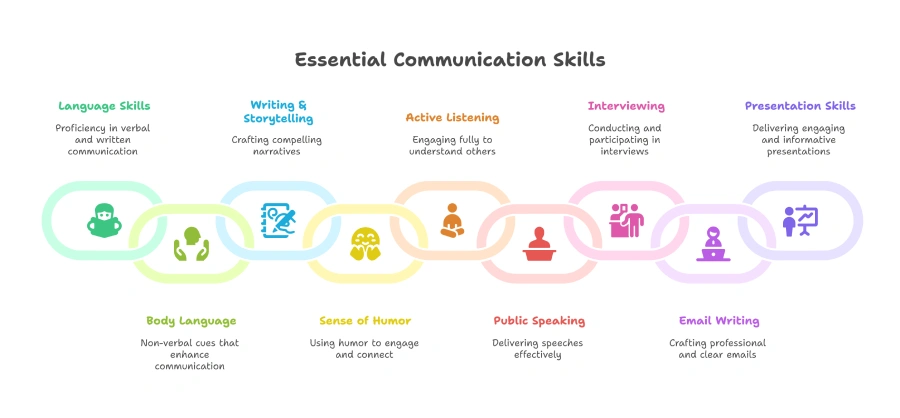
- Language Skills
- Positive body language
- Writing and storytelling
- Sense of humor
- Active listening
- Public speaking
- Interviewing
- Email writing
- Presentation skills on speech.
You should focus on developing these skills from the beginning of your study life. You need to find out where your weaknesses are. You should eliminate weaknesses through practice. You should keep in mind that you need to be proficient in your mother tongue, English, or any other language.
3. Presenting yourself
Presenting yourself skillfully in front of others is also a skill. However, it is not that you have to show others what you are not. Rather, you have to learn to present yourself masterfully by utilising your strengths. You have to keep in mind that you have to ‘brand’ yourself in front of others.
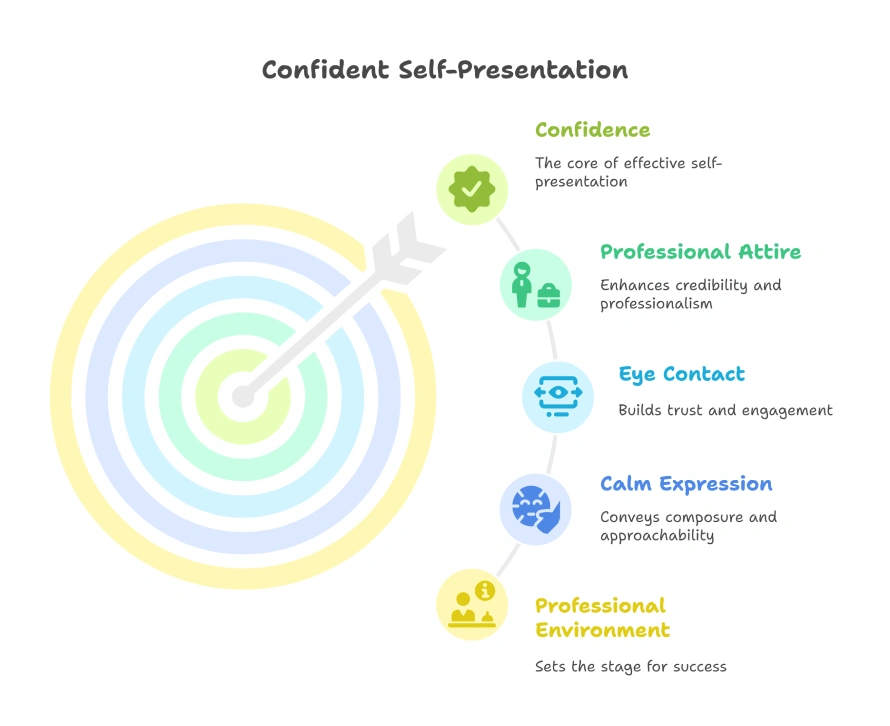
In addition, for this, you should gain knowledge by reading. To put it very simply, those who read a lot keep track of many things. Be it paper books, magazines, newspapers, e-magazines on the Internet, or any portal on profession, science, or business, if you keep an eye on it regularly, you can get an idea of all the recent issues, and it will make you confident to present yourself artfully.
Remember that you will learn many things by reading more and more, which will give you confidence to deliver yourself while speaking. If you lack knowledge, explaining and listening to understand both tasks become difficult.
To develop presentation skills, you need to know the techniques of public speaking or presenting your thoughts. A very popular book to learn about different presentation techniques is the book The Presentation Secrets of Steve Jobs by author Carmine Gallo. The book discusses the techniques of Steve Jobs, co-founder of Apple Computer Inc., for creating various business presentations. If you want to make yourself skilled, you can easily follow the techniques of any famous person. You can watch many videos on YouTube about the techniques of giving speeches by world-famous businesspeople, entrepreneurs, and influential people.
4. Leadership development
Leadership is an art. There is a huge shortage of skills in this art in the world. A family, a society, and a nation face destruction in a leadership crisis. Real leadership is developed only when several specific things work together and success is achieved. Having leadership qualities is now a special qualification in any career. Whether you want to be a manager or a skilled worker, you must have all the qualities of leadership. You must master the ability to build a team, create leadership opportunities, give and take advice, know conflict resolution techniques, practice diplomacy, give and take opinions, supervise, and control the team from a distance.

Effective communication skills will provide you with the opportunity to develop leadership in any field. No one develops communication skills after becoming a team leader or a manager of a corporate organisation. In developing communication skills, anyone can go from an apprentice to an officer in any organisation, from an ordinary member of the team to a decision-making and leadership position.
You can find out what kind of leadership qualities you have by reading books. You can develop your leadership skills by organising various business case competitions, hackathons, and other events in your studies. Leadership qualities can also be developed through work in an organisation.
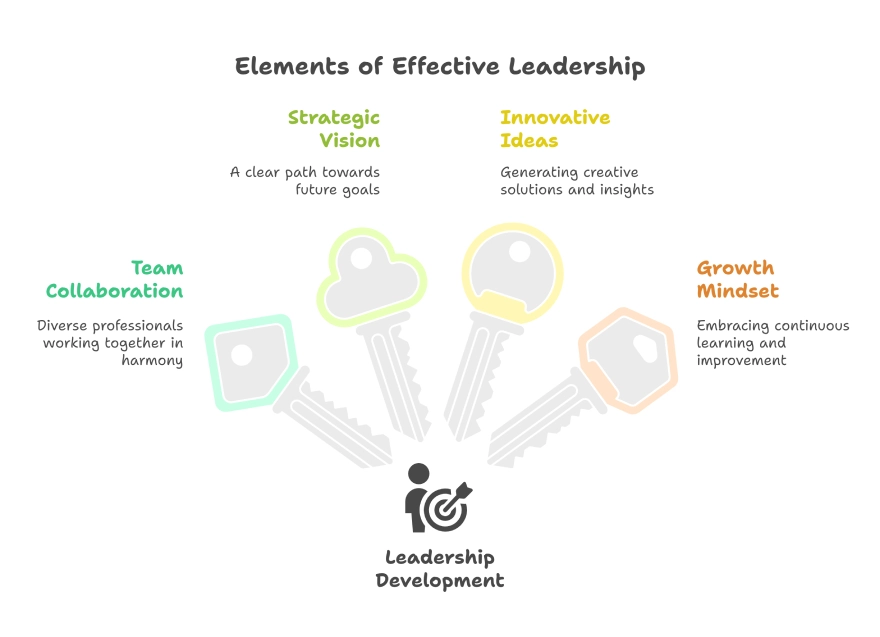
The real formulas are the same in political leadership, business leadership, or any type of leadership. In addition, if you want to build such leadership qualities in yourself, you have to follow some things closely.
True leadership has the most impact on coordinating the goals of the individual and the organisation. The connection between the goals, objectives, and strategies of the organisation and the goals, objectives, and strategies of the individual is what makes a leader successful.
5. Professional skills
Professional skills include the ability to manage an organisation, plan meetings, use technology, know what is happening in other countries around the world, research, understand business etiquette, receive and provide training, and know various aspects of customer service. If you have professional skills, you will not feel afraid or sluggish when you enter the workforce after studying.
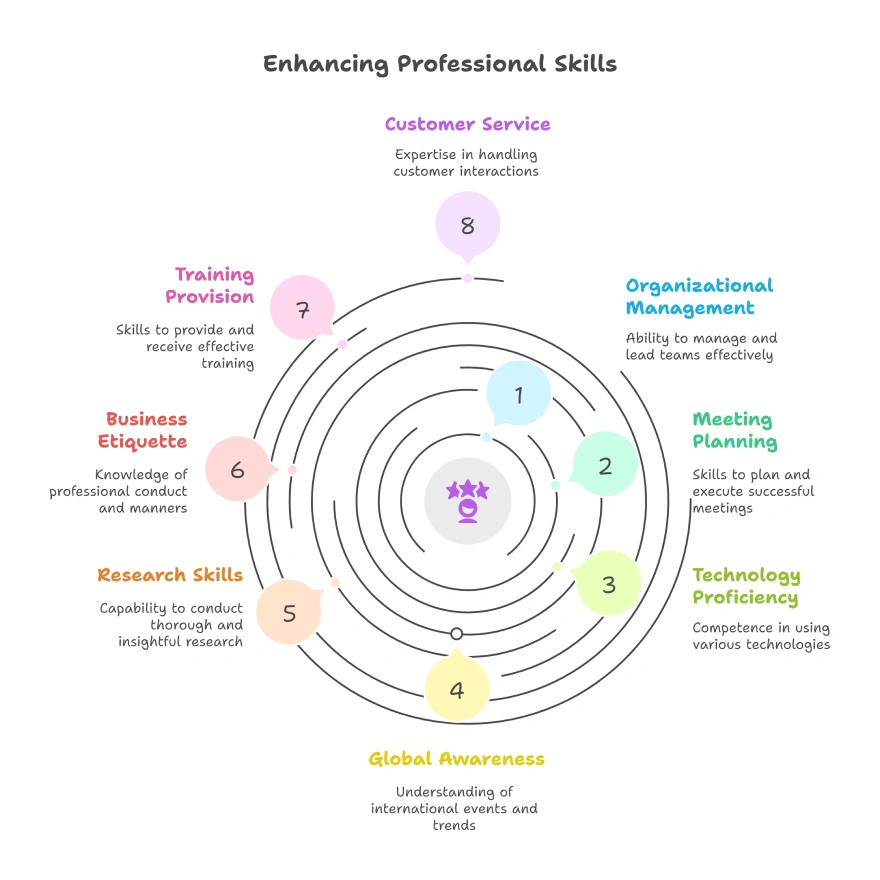
In today’s rapidly changing world, there is no alternative to increasing your professional skills to remain relevant. New skills can help you pass important stages of your career or create new opportunities. There are many ways to acquire new skills. You can acquire new skills through a university or college degree, vocational training courses, or online.
By going through many courses on websites, you can gain the necessary skills that will make a great impact on improving your career.
The websites sometimes offer a variety of free and paid courses. In addition, Babel is a great website for learning a new language; Coach Me is a great online coaching site; Coursera, LinkedIn Learning, and Khan Academy are great places for students to hone their academic skills at the high school and college levels.
6. Personal skills
Your personality depends on how well you can control yourself in a positive or negative environment. Personal skills include emotional intelligence, personal awareness, emotional control, confidence, enthusiasm, and how empathetic and friendly you are. First, you have to find out what kind of person you are, and then you have to identify your weaknesses and improve yourself.
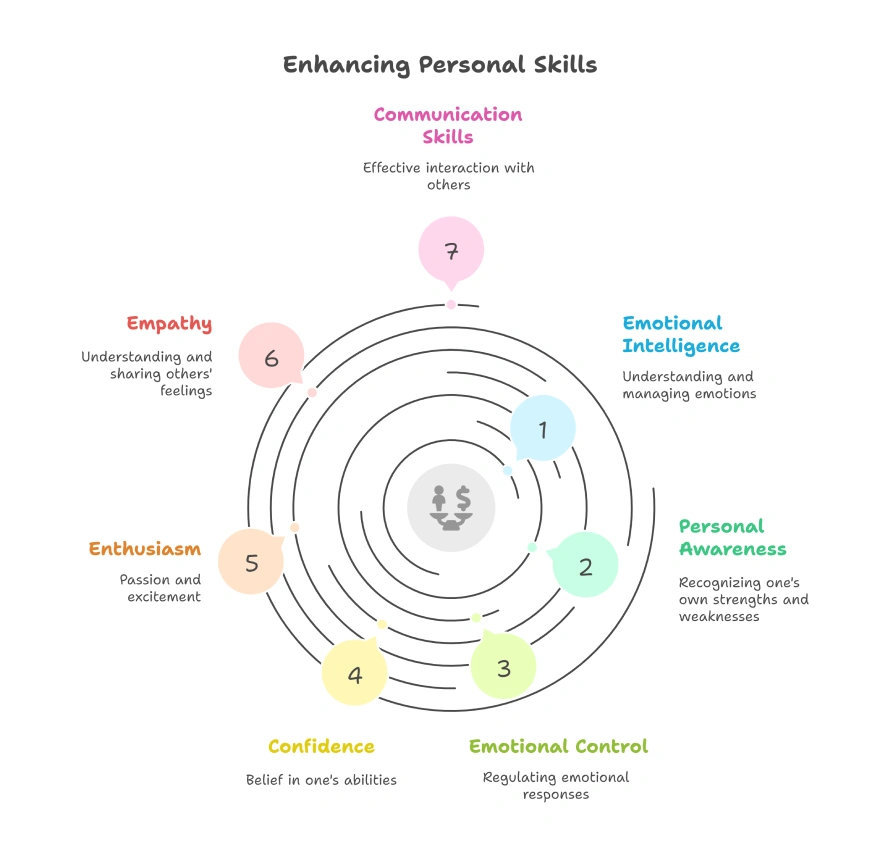
We fall behind in many areas of life because we do not know where, when, or how much to say or how to say it. Each of us is different; when we speak, we speak in our own way based on our experiences. So, if you are an attentive listener, you can learn from the speaker’s expression, experience, and values, and at the same time, you can learn something new from the reactions of others present. If you are an attentive listener, your reactions will prove how much you have been able to build bridges with others.
Self-branding is a popular word now. But first, learn self-introduction. Learn about the communication that can be strengthened without speaking. Take care of smiling, looking into the eyes, maintaining the correct standing or sitting position, etc.
Just as effective communication is possible in just five seconds with the power of your skills, you may be knocking on the wrong door for the rest of your life due to the lack of real guidance. So correct yourself while you have time. By reading the book, you can learn how and in what creative ways emotional intelligence or intellectual emotions can be developed.
7. Eagerness to learn
The most significant soft skill is having an eagerness to learn and apply what you have learned. After completing university studies, we often feel proud of ourselves and do not want to learn anything on our own, which is a trap. The eagerness to learn will be lost as soon as you start thinking of yourself as a wise person. If you cannot learn, you cannot move your career or life forward. You have to go to everyone older or younger than you to learn. However, you do not know who will teach you anything.
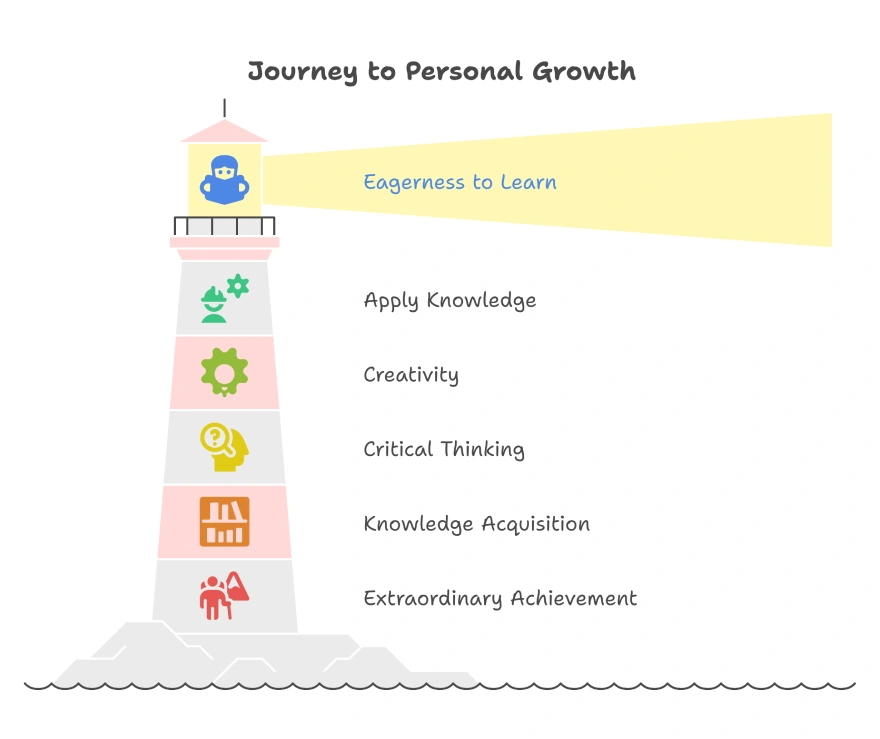
Life teaches us a lot. Never stop learning from life. We are all students of life because this learning makes us creative. Creativity drives people towards thinking; thinking gives people knowledge. Moreover, this acquired knowledge makes people extraordinary, makes them different from others. So never stop learning; always keep learning.
There is no alternative to the eagerness to learn in order to do well in your career. Learn on your own, take reasonable feedback from others, and correct or change yourself accordingly. No matter which university you study at or what degree you have, you have to learn constantly to keep up with the times.
Ask yourself questions about the work you do in the office every day:
- Why do you do it?
- Why do you do it this way?
- What are the benefits of doing it?
- What are the disadvantages of not doing it?
After joining a new job, it may seem a bit chaotic at first. However, the authorities think that you are interested in learning and that you are suitable to teach.
8. Sensitivity
Your sensitivity is your lifelong strength. How quickly you can recover from a failure or how positive your reaction to failure is—these qualities are sensitivity. You have to learn through practice how positively you can control your emotions.
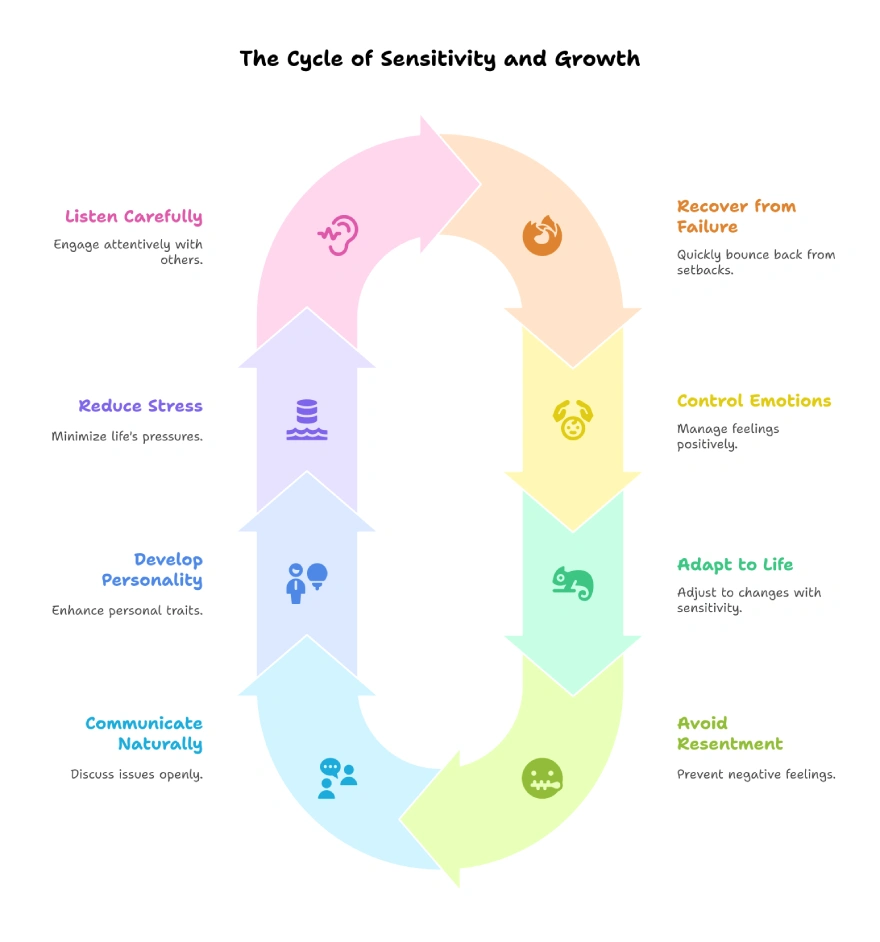
To experience the higher levels of life, you need to be sensitive to life. And you have to adapt and move forward with this sensitivity. Avoid creating resentment in your mind. If you dislike something, discuss it naturally. This will make others familiar with your attitude, and you will clarify your position. You should develop your personality. You should not create any situation where others can get an opportunity to irritate you. You can avoid many unwanted incidents in your life by handling situations properly. Try to reduce stress.
Many sensitive people are introverts. They do not like extra noise, large groups, etc. If you have a problem, you can avoid these things. One quality of sensitive people is that they want to listen to others carefully. Because of this quality, they often become loved by others. It is easy to advance in various fields by utilizing the qualities of sensitive people.
9. Creativity and innovation
Creativity and innovation are two top quality out of 10 skills for success. How successful you will be in life depends on your creativity and innovative skills. Creativity is related to the aesthetics of your intelligence. To develop innovative skills, you can work with an experienced person. You can apply the ideas that are stirring you, not just keep them in your head. Only then will you know your strengths and weaknesses.
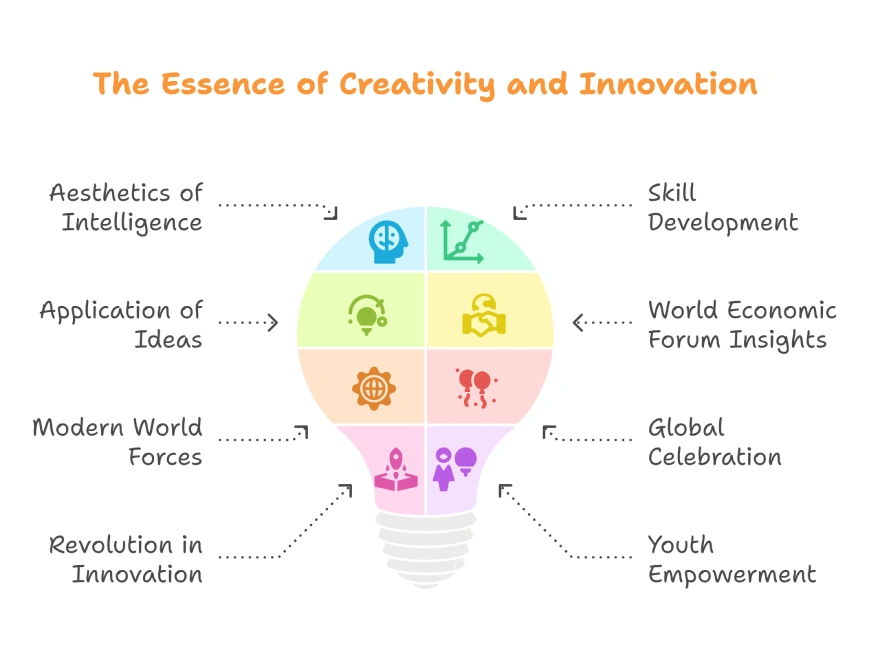
According to the World Economic Forum, creativity, originality, and initiative are among the top skills required for future jobs.
And according to experts, creativity and innovation are the biggest forces in the modern world. This day is celebrated worldwide so that people pay more attention to new thoughts, ideas, and innovations, which can help solve the complex problems of human society. Analysts say that a revolution is underway in the scope of innovation in the current world, and it is necessary to create an environment that expands the innovative skills of young people. You should be involved in innovative activities to move forward quickly on the path of progress.
10. Problem-solving and decision-making
We often think about problems in our lives. However, we do not get a chance to think about solutions while thinking about problems. We have to learn different problem-solving techniques from student life or an early stage. To solve problems, we have to master different techniques of mathematics and logic. We have to learn to pay attention to logic and reality rather than emotions in decision-making.
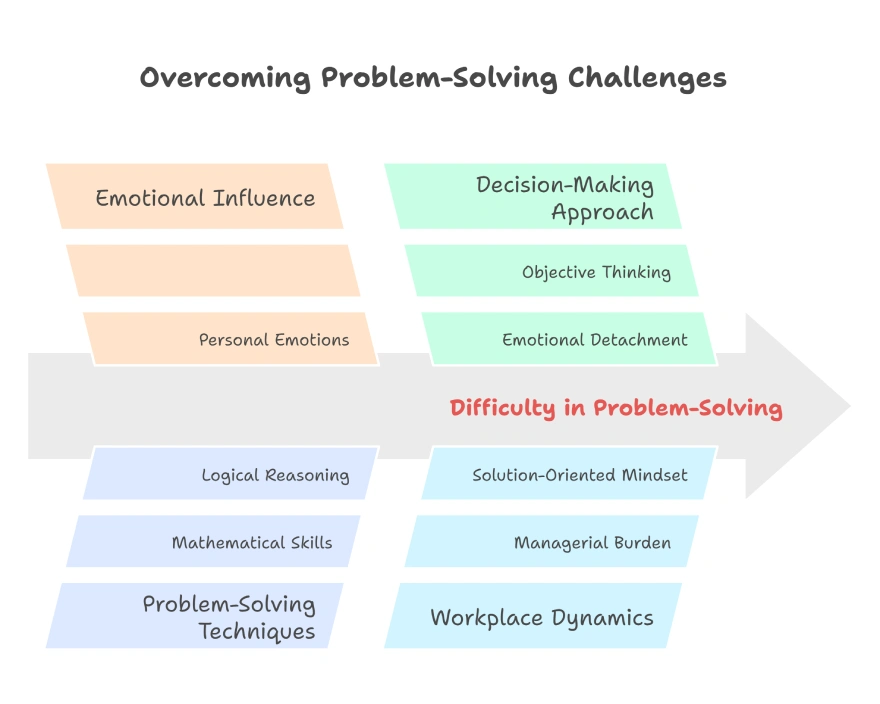
Whether there are problems in life or not, we have to think about almost everything. However, it is quite difficult to think realistically and objectively. When making a difficult decision, if you put yourself in a third person’s place and think, your emotions are greatly reduced, and you can think objectively. People have the ability to reason more sensitively about other people’s problems than their own. This increases the ability to verify, and any faulty thinking can turn into subtle suggestions.
You know that we often suffer from difficult indecision in solving our problems, but when solving the same problem for others, it seems easy to make decisions or give advice. The whole thing happens because of emotions. People are naturally more emotional about themselves. So, when you think about it from a third person’s perspective, it becomes much easier to make a decision.
Everyone tells their manager or boss about all their problems. As a result, everyone’s problems become the manager’s problems. If you encounter a problem, try to solve it yourself. If you do not have the power to make the final decision, tell your boss the solution and ask for their help. But you should know that every job in every field needs people capable of creating solutions to tough problems.
Conclusion
Finally, it is claimed that students often neglect soft skills. However, they should not do so. You should be able to motivate yourself to get tasks done. Life gets busy, both in and out of the workplace. Time is very important in life, so we shouldn’t waste it. The above-mentioned 10 skills for success should be practiced in our everyday lives.
FAQs
What are the 5 skills for success?
The top 5 skills for success are communication, adaptability, emotional intelligence, problem-solving, and eagerness to learn.
Which organizational skills are important for professional success?
The main organizational skills are time management, delegation, prioritization, documentation, and goal-setting. These skills boost productivity and efficiency at work.
Which of the following is not a success factor for having strong collaboration skills?
Active listening, empathy, and clear communication are key to success, but working alone without others’ input is usually not seen as a success factor for collaboration.
Bridging the skills gap: Why reskilling your workforce is critical for success?
Reskilling is important because of automation, new technologies, and changing market needs. It helps employees stay useful and competitive. Read more in McKinsey’s Reskilling Guide.
Critical thinking and research skills are essential for success in which of these career pathways?
Critical thinking and research skills are key for success in STEM, law, academia, journalism, healthcare, and consulting. They help in analyzing problems, making decisions based on evidence, and creating new solutions.
Why communication skills are crucial for success in the workplace?
Good communication is key to success at work. It helps people work together, cuts down mistakes, boosts productivity, and builds strong relationships. Clear communication makes sure everyone understands their tasks and goals, encourages teamwork, and avoids confusion. It also builds trust with coworkers and clients, helps solve conflicts, and shares ideas clearly to encourage innovation and efficiency. Learn more from MindTools: Communication Skills.
How are team skills important for lab success?
Team skills are key for lab success because they ensure safety, accuracy, and efficiency. Good teamwork lets members share tasks, follow rules, and communicate clearly, reducing mistakes and boosting productivity. Strong collaboration builds trust, helps solve problems, and leads to better results in complex labs.
What are some common skills required for success in STEM fields?
Success in STEM fields needs clear thinking, problem-solving, technical skills, teamwork, and a love for learning. These help professionals solve tough problems, create new ideas, work well with others, and keep up with new tech. Good communication is also key for sharing ideas and making progress.
How important communication skills for success (percent)?
Communication skills are key to success, making up 85–90% of jobs involving people, management, and leadership, especially in teamwork and client roles, according to Harvard Business Review. Their importance changes by industry, but is always crucial for building relationships, teamwork, and reaching goals.
One key success factor for nurturing strong collaboration skills on a team is what?
A key to building strong teamwork is trust. Trust creates openness and respect, letting team members share ideas and work well together. It makes a safe space for collaboration, encourages honest talks, and helps teams solve problems. Without trust, teamwork falls apart, so trust is essential for successful collaboration.
How can students develop soft skills for success?
Students can develop soft skills for success by engaging in group projects to build teamwork and communication, taking on leadership roles in clubs or organizations to enhance decision-making, attending workshops to refine skills like problem-solving, participating in internships for real-world experience, and using online platforms like Coursera or FutureLearn for targeted courses on skills such as emotional intelligence and time management.
What is the difference between hard and soft skills for success?
Hard skills are specific technical abilities needed for a job, like coding, accounting, or data analysis, usually learned through education or training. Soft skills are people skills, such as communication, leadership, and teamwork, which help with working well with others and adapting to different roles. Both are essential for success, with hard skills providing expertise and soft skills fostering effective interactions and problem-solving.
